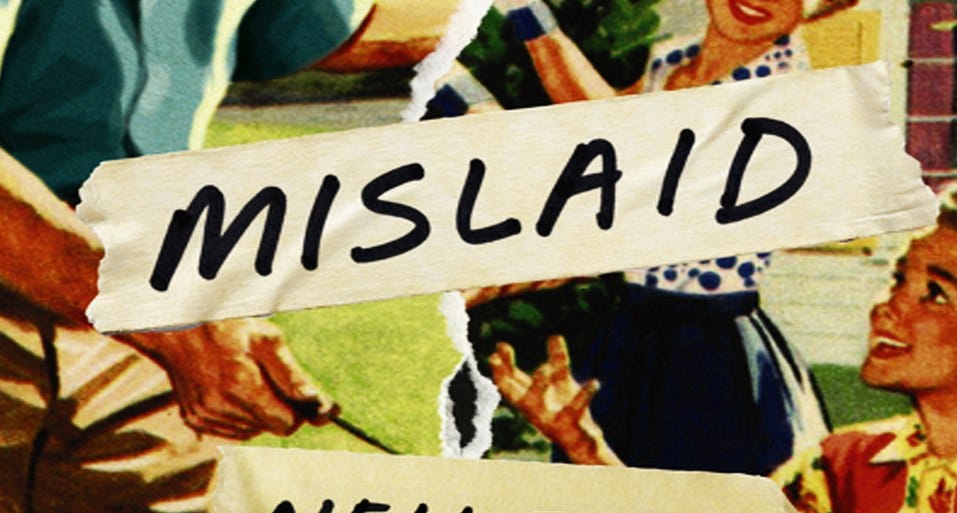Books & Culture
Think Fast, Speak Even Faster: Mislaid by Nell Zink

by Alina Cohen

Perhaps most impressive about Nell Zink’s forthcoming Mislaid (May 19) is the author’s seemingly endless capacity for wit. When her protagonist, Peggy, gives birth to her gay husband’s son (Peggy herself is a lesbian), he proclaims that there won’t be any circumcision, believing that the practice was “dreamed up by moralists and lotion salesmen to make hand jobs chafe.” As a young man, the son asks his father, “Remember Antietam?” His father, Lee, replies, “sure, a lot of good men died,” and the son retorts, “no, I mean when I drove the car.” Zink peppers her story with clever one-liners and quick exchanges. Her characters think fast and speak even faster — about everything from circumcision to philosophy. When their marriage inevitably disintegrates, Peggy runs away from Lee and begins concealing her identity. She tells a “feminist encounter group” that her husband was an entomologist, “feeling that an intellectual in the family might make her butchering of Foucault seem less out of place.” It’s smart, sharp prose that invests the reader in the story.
The plot itself features a quirky, surprising series of comic adventures: Lee and his son, Byrdie, continue their lives in Stillwater, Virginia, where Lee is a poet and professor at an all-women’s university carrying on affairs with both men and women. Byrdie attends the University of Virginia where he’s tapped by a secret society and develops an interest in business administration, architecture, social work, and running for office. Peggy steals the identity of a black mother and daughter for herself and her daughter, Mireille. She begins hunting night crawlers and then collecting psychedelic mushrooms to support them. An alluring lesbian professor named Loredana, who goes by the name of Luke and is writing about a black lesbian playwright, comes into Peggy’s orbit.
“I didn’t want to join a fraternity anyway,” says Temple, Mereille’s boyfriend. “I was going to join a liberty first, and then an equality.” Sure, it’s a good joke, but it feels like something any of her characters, too smart for their own good, could have said. In fact, little emotion lurks beneath the surface throughout the novel. The omniscient narrator tells the reader what he or she should know, and there’s little to question. After Peggy abandons her husband and son and runs away with her daughter, the narrator states, “here a person might ask: Was Meg self-centered or what?” and answers that question explicitly: “Meg was self-centered. Early life spent fighting for chances to be herself, planning the cockeyed social suicide of manhood in the arm; weeks of unrequited lesbianism…” The narrator continues, listing all the events in the character’s life that have made her the way she is, or at least the way the narrator wants the reader to view her. There’s no subtext, no subtlety, no mystery for the reader to unpack. Thus, while the narrative touches on many loaded subjects — race, sexuality, affirmative action, welfare, drug trafficking, the feminist movement — the views come across without nuance since the injustices are blatant and occur to unreliable, underdeveloped characters.
Perhaps what’s most striking about Zink’s treatment is her insistence that her themes can be funny. She can crowd a novel full of the most contentious topics in our society and make it a pure comedy. This is a brave choice, an indication of Zink’s confidence in her own writing and humor to depict potentially troubling racial, sexual, and socioeconomic politics. Ultimately, Zink is able to pull off what Peggy, an aspiring playwright, can’t. As Peggy hones her craft, it’s “like honing a primitive tool, not a forged blade. Life with Lee had taught her to be laconic. She could quip. So her plays all ended on page two.” Zink, remarkably, turns her quips into a cohesive, full-length novel full of hijinks and clever remarks. It’s enjoyable, if not as thought provoking as it could be. There’s an unusual zest to her writing and in the zany situations she dreams up. It’s the voice of the narrator, and one might say Zink herself, that leaves the most lasting impression. And that, certainly, is admirable.
[Editor’s note: read “The Wallcreeper,” from Nell Zink’s previous novel of the same name, as recommended by Dorothy, a Publishing Project in Electric Literature’s Recommended Reading]

by Nell Zink










